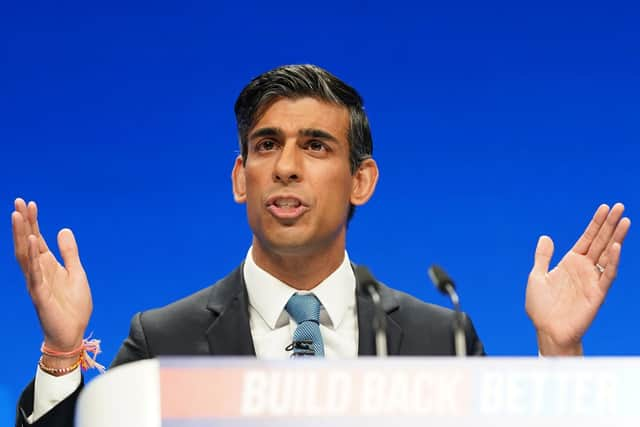National Insurance is adored by politicians because it doesn't sound like tax - Bill Carmichael
Well, if you are in paid work, or you employ someone, you certainly will do.
Because this week our Government has decided that now is the perfect opportunity to absolutely clobber hard working people, particularly the less well off, and any employer who gives them a job.
Advertisement
Hide AdAdvertisement
Hide AdThat’s right, just at the point when inflation is heading for double figures, energy prices are going through the roof, and we are struggling out of the worst pandemic in recent history, what better time to strangle any economic recovery at birth than with the heaviest tax burden since Clement Attlee was Prime Minister in the 1950s?


I suppose we should consider ourselves lucky. Rishi Sunak insists he is a “low tax Chancellor”.
Just imagine what we’d be paying if he was a high tax chancellor!
Perhaps I am being unfair to the Conservatives – but the best you can say about them is that they are little different to all the rest.
Advertisement
Hide AdAdvertisement
Hide AdIn fact if Labour, Lib Dems or Greens had their way, taxes would go up even further.
If you are hoping to vote for a genuinely low tax party in an election then I am afraid you are going to have a long wait.
According to politicians, increasing taxes is the answer to all our problems.
Want to tackle global warming? – put taxes up! Want to save the NHS (from what isn’t entirely clear)? – put taxes up! Want the police to investigate actual crime instead of sitting reading Twitter all day? – put taxes up!
Advertisement
Hide AdAdvertisement
Hide AdIn short, politicians of all stripes absolutely love taxes, because there is nothing they like to do more than spend other people’s money on their pet projects.
But they particularly adore National Insurance, which has rocketed this week, because it doesn’t sound like a tax.
That’s exactly why the Chancellor has chosen to increase National Insurance Contributions (NICs) by 1.25 pence in the pound starting this week.
There is indeed a lot of confusion about National Insurance, which some people associate with good things like the state pension and the NHS.
Advertisement
Hide AdAdvertisement
Hide AdMany people, my late father included, saw it as a personal pot of money that the government put aside for you, and which you could dip into when you needed it.
But sadly, there is no stash of cash with your name on it.
National Insurance is just another tax like any other and it all goes into one enormous pot for public spending, over £1,000 billion a year at the last count, or the equivalent of £38,000 for every household.
And National Insurance is a particularly pernicious form of tax. The rate goes down the more you earn, and it is only payable on wages – income from investments or rental income is not included.
As a result it falls particularly hard on the less well off, who in addition are also badly hit by inflation and high energy costs.
Advertisement
Hide AdAdvertisement
Hide AdFurthermore, National Insurance is also paid by companies for each person they employ.
In other words, you pay for the privilege of working hard, and then your boss pays an additional amount of tax for the privilege of employing you.
It is in effect a tax on jobs – and if you heavily tax jobs, the chances are you will end up with fewer of them.
The Government says the increases in taxes will be spent on health and social care.
Advertisement
Hide AdAdvertisement
Hide AdAs far as social care is concerned – the Cinderella of public services – I will believe it when I see it.
As for the NHS – can you honestly imagine any point in the future when spending will be enough? When the NHS will say: “I’m sorry Chancellor, but we can’t possibly spend any more money – we’ve employed all the diversity managers and sustainability coordinators we can find!”
No, regardless of the endless billions we pour into the insatiable maw of the NHS, it will never be enough.
Time was, in the distant past, that there were some people, in the Conservative Party at least, who understood that if you allowed people to keep more of the money they earned, they would spend it more wisely than politicians and bureaucrats ever could.
Advertisement
Hide AdAdvertisement
Hide AdThey would spend it on things they needed and wanted, and this in turn would create more jobs, more wealth and provide more money for public services, in an upward spiral of prosperity.
Lower taxes lead to higher growth and more prosperity; higher taxes lead to lower growth and more poverty. Simple.
Why has such economic common sense become anathema to every mainstream political party?
Bill Carmichael is a writer who teaches journalism at the University of Sheffield.